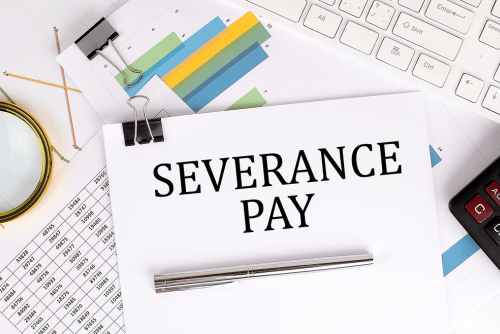
Blog
- Workplace Health & Safety
Home
Resources
End of Employment

Kiljon Shukullari, HR Advisory Manager
(Last updated )

Kiljon Shukullari, HR Advisory Manager
(Last updated )
It is crucial for employers to know and understand different HR terminologies that are used in relation to employee rights. As an employer, you must ensure that you treat your employees fairly and in accordance with your province’s employment standards.
Termination and severance pay is one area of common confusion for many employers and employees. Though often used interchangeably, termination pay and severance pay are defined differently in Ontario by the Employment Standards Act (ESA) and the Canada Labour Code (CLC) for federally regulated employees. Severance pay is only applicable to these two jurisdictions; hence, the distinction is especially important.
Termination occurs when an employment relationship ends. A worker’s employment can be terminated for several reasons, including:
Alternate terms that are used to connote employee terminations include, “let go,” “discharged,” “fired,” or “permanently laid off.”
According to the ESA, a person’s employment is considered severed when:
Typically, once an employer terminates an employee, the employee is entitled to notice of termination. If the employer prefers to have the employee not work throughout their notice period, they can choose to provide payment in lieu of termination notice (also referred to as termination pay). If the employee works through their notice period, then termination pay is not applicable.
On the other hand, severance pay is reserved for employees in Ontario or those who are federally regulated. The eligibility requirements for severance pay vary between these Canadian jurisdictions.
An employee qualifies for severance pay if their employment has been severed and:
An employee who is entitled to severance pay must be paid seven days after the employment has been severed, or on what would have been the employee’s next regular payday – whichever date is later.
Severance pay may also be paid in installments. However, an electronic or written agreement must be made with the employee or the Director of Employment Standards at the Ministry of Labour (MOL). The payment plan cannot exceed three years, and if the employer misses a scheduled payment, the employee’s entire severance becomes due immediately.
In the Federal Jurisdiction, the Canada Labour Code prescribes that an employee will be eligible for severance pay if they have:
Severance pay must be paid out within seven (7) days after the employee’s employment is terminated, or on the employee’s next regular payday.
As an employer, it is your responsibility to ensure that you calculate your employee’s severance pay correctly. Failure to do so may result in a wrongful dismissal claim which could cost your business thousands of dollars.
Calculating severance pay for Ontario
In Ontario, the Employment Standards Act (ESA) provides a formula for calculating severance pay. Employers must determine the employee’s regular wages for a regular work week, which should be the amount an employee earns in a typical week, excluding overtime. Regular weekly wages should then be multiplied by the sum of the number of completed years of employment and the number of completed months of employment divided by 12 for any partial year.
Calculating severance pay for federally regulated employees
In the Federal jurisdiction, severance pay is calculated as two day’s pay multiplied by the employer’s regular rate of wages for each full year of employment, with a minimum of five days’ pay, multiplied by the years of employment.
There are some cases where employees are not entitled to severance pay. These exemptions can sometimes be complex and may vary on a case-by-case basis. If you are unsure of whether or not your employee is entitled to severance pay, speak to one of our HR experts for free advice.
Our advisors can help you understand severance and clarify any other HR concerns you may have. Our experts can also help you update and review employment contracts, as well as assist with any other HR or health and safety issues that may arise. Give us a call at 1 (833) 247-3652 to learn how our services can benefit your business.
Home
Resources
End of Employment
Find out what 6,500+ businesses across Canada have already discovered. Get round-the-clock HR and health & safety support with Peninsula.
